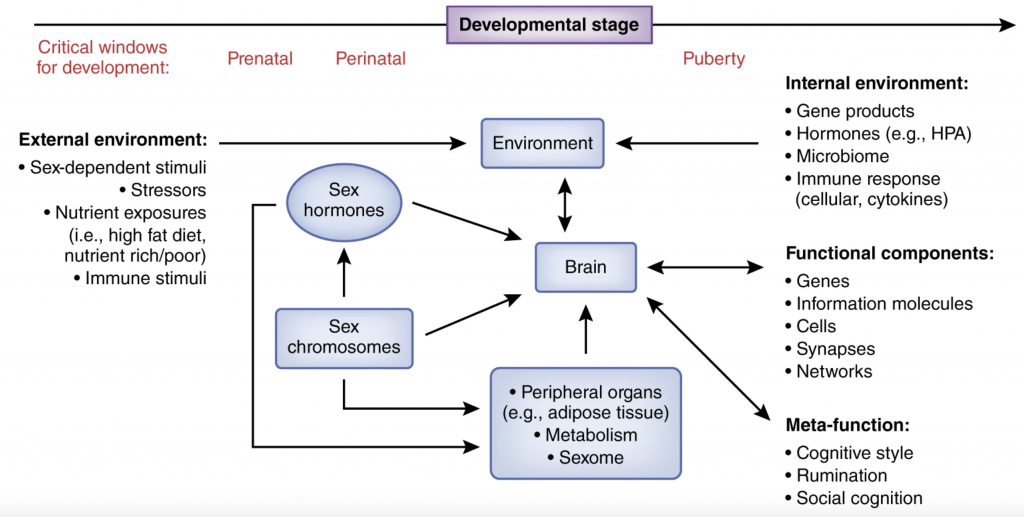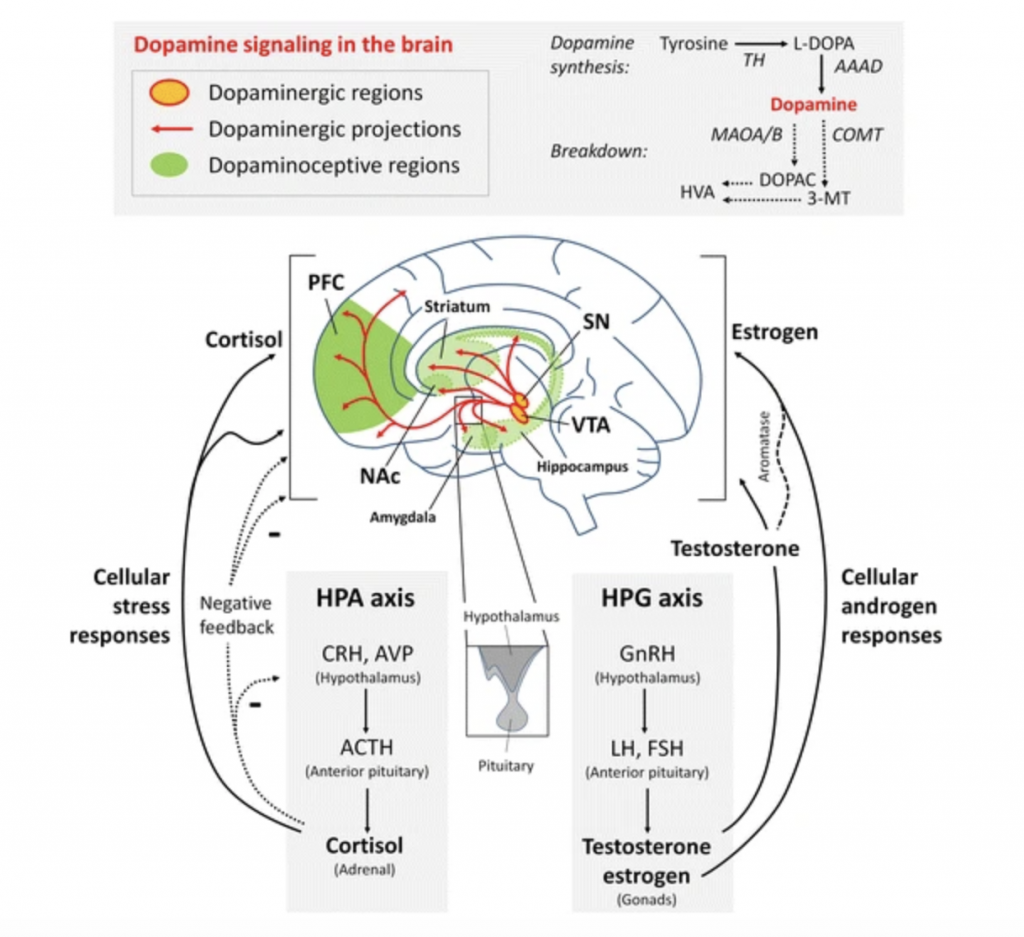Welcome to shanchaT.E.A — Where Science Meets Self-Discovery.
“Feel the Unmapped. Your Journey Starts in Silence.
The Body Speaks: Let Science Be Your Guide

[Schematic depiction of the multiple levels at which sex influences brain function. Sex is a ubiquitous, context-creating modulator of brain and behavior, accomplished through both organizational effects that program subsequent brain sensitivities and development, and activational effects that acutely impact neural function. Sex influences the internal environment in which brain function occurs (e.g., differential exposure to stress or immune soluble molecules) as well as modulating the impact of the external environment (e.g., diet or stressors, particularly in the prenatal environment, or even social responses from others based on sex). Sex chromosomes impact brain development directly, may impact physiology through differences in exposure to gene products (e.g., sex-linked genes or differences in gene dosage), and alter brain function developmentally and activationally through sex-determined gonadal function and differential exposure to sex hormones. Sex differences in peripheral organs (e.g., adipose, liver) lead to differential exposure of the brain to hormones as well as medications (through effects on metabolism). The sexome refers to the cumulative array of sex-related modulatory effects on intracellular molecular interactions. Sex differences appear at all levels of neural organization, from cell to circuit. Finally, reported sex differences in meta-cognitions may influence perception and processing of environmental stimuli, thus influencing affective generation and regulation (references appear in the text)]
-Original research article:https://link.springer.com/article/10.1038/s41386-018-0148-z?fromPaywallRec=false
Decades of research confirm that suppressing natural desires may harm both physical and mental health. The study by Brody from 2015 suggests that engaging in sexual activity can lead to improvements in blood pressure reactivity to stress.
-
- The study found that individuals who had sexual activity recently showed a significant reduction in blood pressure reactivity to stress compared to those who had not engaged in sexual activity.
- This improvement was observed both in men and women, indicating that the beneficial effect is not limited to one gender.
Silence the Stigma, Listen to Your Biology

The amygdala—your brain’s emotional control center—activates during desire. Chronic suppression correlates with:
-
↑ Anxiety (40% higher risk, Kinsey Institute)
-
↓ Sleep quality (PLOS ONE 2020 meta-analysis)
-
Impaired emotional resilience (UK Sexual Health Foundation Survey 2022)
Your Body is the Ultimate Compass
As a female team, we are also considering the practical scenario of women’s products, after doing relevant market research, we position the product direction as follows:
-
Ergonomic design: Medical-grade silicone for physiological alignment.Relaxation tools first standard is safety, then comfort, safety + comfort can really bring pleasure, no pressure to enjoy relaxation.
-
Sensory awakening: Temperature-responsive materials validated by biomechanics labs.In order to achieve a more realistic feeling of use, the temperature control of the product is also strictly handled, hoping that every user can feel its tenderness and temperature.
-
Mindful intimacy: Noise-reduction tech supporting meditative exploration.Noise is an important factor in the experience, and our new mini fancy series is small and uses an ultra-quiet motor at a lower decibel level than you think, allowing you to immerse yourself in every aspect.
-
Sale!

Small Wireless Female Clitoris Nipple Stimulator – 3in1 Electric Breast Clitoral Sex Toy Stimulator Quite Sexual Massager Game for Woman and Couple Pleasure,Remote Control
$30.00Original price was: $30.00.$22.90Current price is: $22.90. Add to cart -
Sale!

Rose Wireless Female Clitoris Nipple Stimulator – 3in1 Electric Breast Clitoral Sex Toy Stimulator Adult Toys Sexual Massager Game for Woman and Couple Pleasure,Remote Control
$35.00Original price was: $35.00.$27.90Current price is: $27.90. Select options -

Nipple Toys Nipple Clamps Sex Pleasure Women with 10 Vibration Modes, Silicone Lightweight Invisible Nipple Toy, Vibrating Nipple Clamps Adult Sex Toy for Women Couples Pleasure
Read more -
Sale!

Vibrator Wand Sex Toys [ Clit Stimulator ] Vibrators for Woman Adult Toy | Gifts for Women | 20 Patterns & 8 Speeds of Pleasure | Quiet & Small -Standard – Purple
$35.00Original price was: $35.00.$21.90Current price is: $21.90. Add to cart -
Sale!

Adult Sex Toys 4 in 1- Clitoral Grinding G Spot Rotating Vibrator for Dual Stimulation, Remote Control Wearable Vibrators with 3 Rotating and 9 Vibration Modes for Women Couple Play
$68.00Original price was: $68.00.$40.90Current price is: $40.90. Add to cart -
Sale!

Wearable Vibrator for Women Sex Toys – 3IN1 App Remote Control Vibrator Adult Toys with 10 Bunny Vibrators & 10 Thrusting Dildos Vibrater Sex Toy
$78.00Original price was: $78.00.$49.80Current price is: $49.80. Add to cart -
Sale!

Vibrator Adult Sex Toys for Women – Tongue Thrusting Vibrators Dildo Sex Toys with 9 Vibration Mode, G Spot Clit Stimulator Pleasure Tools for Female Couples Games
$78.80Original price was: $78.80.$40.49Current price is: $40.49. Add to cart -
Sale!

Wearable Panty APP Remote Control Vibrators Adult Sex Toys for Women or Couples, Clitoral Mini Egg Bullet Butterfly Vibrator Rose Toy, G Spot Dildo Vagina Stimulator with Tongue Licking Sex Machine
$51.90 Select options
Why Wait? The Journey Begins Within.

Leave a Reply